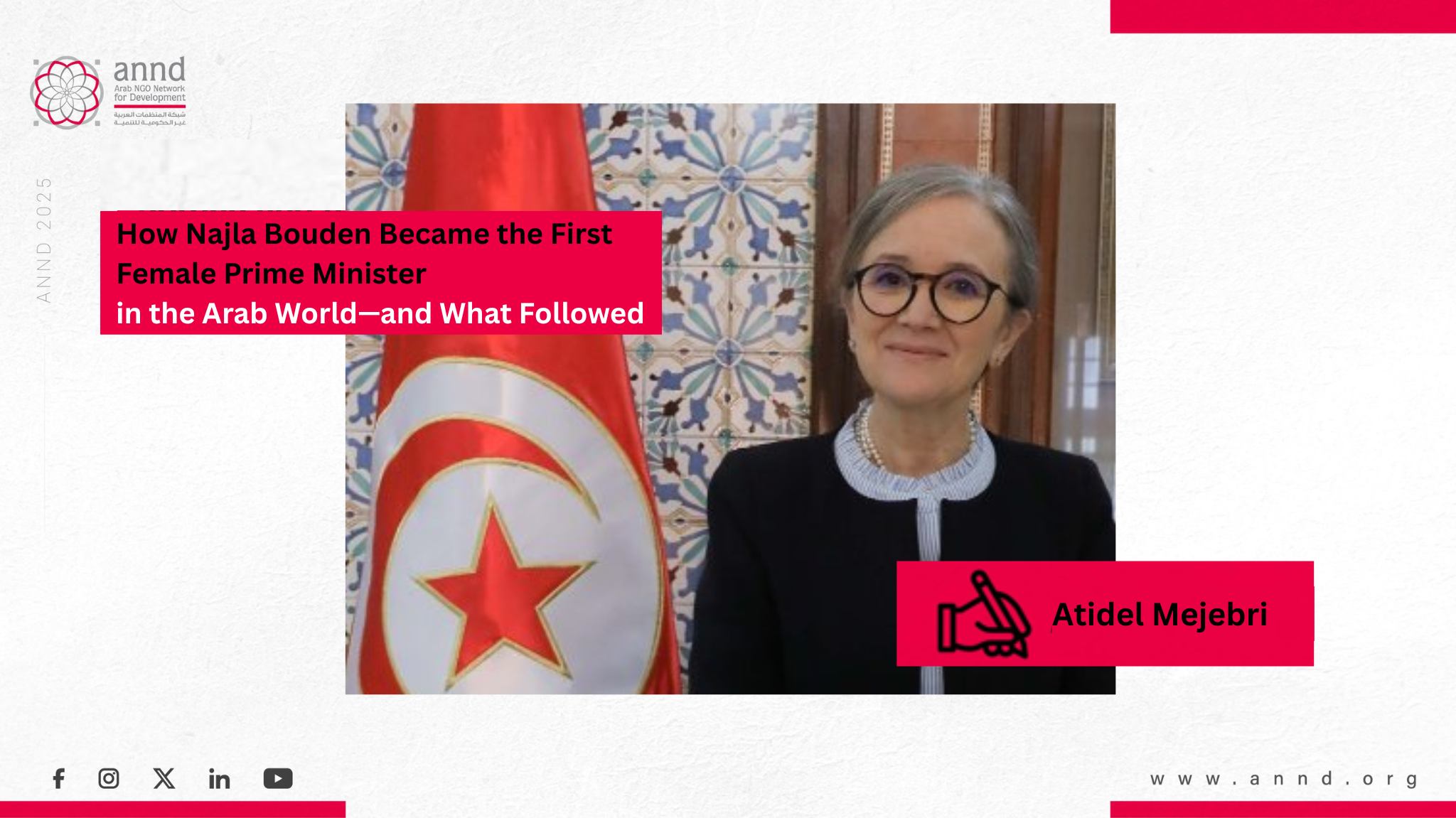How Najla Bouden Became the First Female Prime Minister in the Arab World—and What Followed
It is no longer possible today in Tunisia to approach women's political participation with the traditional analytical tools we are accustomed to when addressing these topics for many reasons.
Nor is it possible to compare the period 2011–2021 with the period that followed after the Tunisian president's exceptional measures, because Kais Saied is, according to many observers, outside political, ideological and even procedural classifications. He embodies a paradox that requires pausing over it and analyzing it deeply with regard to the popularity he enjoys, which was embodied by the election results that placed him by a wide margin ahead of the other male and female candidates on the one hand, and the hope of a large portion of the people in the measures he took on July 25, 2021, to concentrate powers in his hands, of course in exchange for broad rejection from most parliamentary blocs at that time on the other hand.
The political arena, both the ruling and the opposition as well as the active civil society organizations at that time, did not capture the moment that the president himself and his supporters described as historical or decisive, nor what followed from measures that altogether canceled the institutions of democratic transition and legislations and procedures, including everything the human rights and women's movement sought to establish in order to support the Tunisian woman's access to electoral bodies and decision-making positions...
And although Tunisian women achieved progress in representative bodies in the interim period between 2011–2021, the successive governments at that time rarely institutionalized a political will that broke with the traditional representational role of women at their core. Apart from some diversity in ministerial portfolios, no government expressed a discourse or practical measure for a distinguished position for the Tunisian woman within the compromises that marked political debate and governance in that period...
The measures of 2021 came "to throw" everything that civil society organizations had worked hard to achieve into a loop of ambiguity in a first stage and then a loop of fogginess in a second stage until the President of the Republic took the decision to appoint the first female prime minister in Tunisia and the Arab world, Najla Bouden.
Najla Bouden was not a familiar political face nor a known association figure; rather she is an academic and a daughter of the Tunisian administration, which is full of female competencies that rarely appear at the forefront of public affairs events, and that is an important symbolism in the search for "hidden" competencies.
And since we understand that first impressions about any political actor are of considerable importance, Najla Bouden's first appointment enjoyed acceptability without notable reservations. She is a woman who appears sober and elegant and in her behavior there is clear refinement...
The image of Tunisia that speaks
A large proportion of citizens pinned hopes on her that were essentially related to the image of Tunisia: that its prime minister would be a woman "who honors in appearance and discourse", hence their celebration of her whenever she traveled, especially on visits abroad — she is the one who reminds them of Angela Merkel and Hillary Clinton and consequently places Tunisia among developed countries. Supporters of President Saied knew, indeed celebrated, him as a president who gathered all powers in his hand to break with a decade full of appearance — appearance, not action.
Bouden spoke English to support the candidacy file of Bilal Al-Jammousi for the position of Director of the Standardization and Communications Office at the International Telecommunication Union during the Davos conference, and she also spoke Arabic at the opening of the regional forum on agriculture between the public and private sectors in the North Africa region to achieve sustainable and inclusive development, as well as at the Arab Administration Forum on the sidelines of the World Summit on the Information Society in Dubai; she convinced and performed well according to observers.
Tunisians celebrated her speech in Paris in French during the Entrepreneurship Conference, especially when she confirmed Tunisia's hosting of the Francophonie Summit in response to the skepticism that was aimed at Tunisia at that time and to rumors about withdrawing Tunisia's hosting of it. Her speech was strategic, sober, and at the heart of the conference topic a source of pride for Tunisian men and women, especially since she concluded with the phrase "See you in Djerba next November on the occasion of the Francophonie Summit," and that was, in the view of observers, a sign of cleverness and refinement in response to the wave of skepticism and rumors about withdrawing the event from Tunisia after its postponement, which is in the ABCs of discourse analysis as well.
Tunisians' pride in her was also embodied when she spoke Japanese during her meeting with the Japanese ambassador to Tunisia and in her words during an official reception for delegations of the Tokyo International Conference on African Development.
The prime minister moved in the field in a way different from those who preceded her in the same position. She is the one who broke the Ramadan fast at a senior care institution and shared children's Eid joy at "S & S", and we saw her among ranks of security forces on New Year's Eve and with the Tunisian General Labour Union on the occasion of International Workers' Day and in a meeting with female heads of diplomatic missions and representatives of international organizations accredited in Tunisia and female general directors and heads of administrative structures affiliated with the Presidency of the Government...
It is very natural that the celebration of her reached the extent of postponing judgement for her or against her; that period of her appointment represented, for a not insignificant portion of the Tunisian people, a break with what the head of state and his supporters called the "black decade."
The silent prime minister of Tunisians
Najla Bouden remained prime minister or "charged with managing it" for nearly two years, including 24 ministers among them 10 female ministers whom she proposed to the President of the Republic who appointed them. The government formation she led witnessed many dismissals that observers of Tunisian public affairs saw as direct decisions from the head of state.
And it is true that the prime minister was appointed during a period in which she faced great challenges represented by the social, political and economic crises that Tunisia experienced during her tenure and others related to concluding a final agreement with the International Monetary Fund, and a decline in Tunisia's credit rating; nevertheless that did not save her and she faced criticism from observers and opponents of the president.
Be that as it may about statistics and data and their importance, and despite Tunisia breaking a historical barrier by appointing her at the head of the government as the first woman to assume the premiership in Tunisia, Najla Bouden was described as "silent" since she never addressed the Tunisian people with a speech and she also did not form an exception in her meetings with the head of state in that she always and forever presented a "platform" for his directives. It became customary for the president to appear speaking while ministers presented platforms and did not utter a word.
She was also described as "kind" in an article whose author was subject to legal questioning after listing her government's failures economically and socially, and descriptions such as "the executive director of the government" and "the president's prime minister" were used about her... So did President Kais Saied wrong Najla Bouden when he appointed her?
The immediate answer: certainly not. While Kais Saied affirmed that the era of appointing a woman for the first time to this post in Tunisia is an honor for Tunisian women and that this step "makes history," he stressed the necessity of discipline and commitment to the state's choices; according to him "no minister can act outside the policy set by the head of state, and harmony is required among members of the government." And although he also stated at the formation of the government, "the Tunisian woman is not a cosmetic accessory," the horizontal relationship between him and the prime minister, which was highlighted communicatively on the presidency's page, does not indicate an active woman who devises solutions outside the president's directives and decisions, including evaluating ministers, dismissing them and carrying out ministerial reshuffles.
The people want, or they do not want
And that is consistent with his previous positions. President Kais Saied did not carry with him promises to improve women's political conditions; rather he confirmed during the political debates that gathered him with various presidential election candidates in both rounds that "constitutions and international treaties existed but did not lead to anything," rejecting "centralized construction as if it were a favor from the ruler" and that he carries "a trust of a people"... that "people who know what they want provided they are enabled with the mechanisms and tools that elevate their demands to the level of decisions"...
Does the foregoing mean that the Tunisian people do not aspire to better participation of women in the political field or that the issue is not a priority for them? If yes, what becomes of the role of the main actor in the Tunisian matter in this regard?
Kais Saied amended the electoral voting system and thereby abolished the principle of horizontal parity at the head of lists, causing the percentage of women's representation to decline from 31 percent in the Assembly of People's Representatives in 2014 to 16.2 percent in the current parliament despite the proportion of female voters who voted for him being estimated at 90.4% of the women who voted, compared with 88.3% of men...
The President of the Republic gathered most powers and it became impossible to see a prime minister different from the other ministers contributing to designing the state's choices and offering solutions to various situations and unique in a specific rank, which made Tunisian women in particular, after multiple experiences, consider the matter differently according to two factors. Will the effectiveness of the political woman — not her appointment to the highest positions, for that happened in Tunisia — remain dependent on the existing political system of governance and not, as we knew it, on a political will that pushes women to the front of an authoritarian rule? The second factor is the effectiveness of women's political participation at the heart of the political transformations that Tunisia has continued to witness since 2011, with the belt of the human rights and women's movement pressing to create mechanisms that automatically guarantee their access to effective decision-making.
The Tunisian experience proved that neither this factor nor that one consolidated the effectiveness of meaningful political participation, which necessitates deeper analyses and a more effective study of a Tunisian experience that derived various solutions so that actual participation of women remains below the hoped-for level in numbers and positions.



